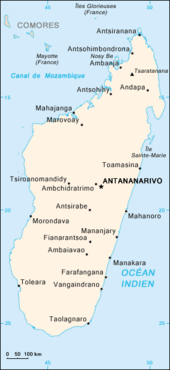Change of government in Madagascar in 2009
The change of government in Madagascar in 2009 was an upheaval backed by the Malagasy military in spring 2009.
On January 27, 2009, unrest broke out against the government of President Marc Ravalomanana , who was accused by the opposition of personally enriching himself at the expense of the country through his administration. The trigger was the government's decision to shut down TV Viva , which broadcast a speech by Didier Ratsiraka . The leader of the demonstration, Andry Rajoelina , until then mayor of the capital Antananarivo and owner of the television channel, proclaimed a counter-government that was not democratically legitimized. Constitutional lawyers rate this as an attempted coup. When the supporters of Rajaoelina tried to storm the city palace of the president at his request, they were prevented by the police using firearms.
After his failed coup attempt, Rajoelina first fled to the French embassy on March 6, 2009 and from there secured the support of the Malagasy military within a few days. Rajoelina then again set up a transitional government. On March 16, 2009, military units occupied the official residence of President Ravalomanana, who had previously rejected requests to resign. On March 17, 2009, President Ravalomanana resigned and passed the duties of office to a military directorate under the direction of Vice Admiral Appolite Ramaroson Rarison , who refused to take power and declared Andry Rajoelina president. At least 140 people have been killed in the unrest since January 2009.
Only a few days later, on March 21, 2009, Rajoelina was sworn in as the new president. As one of his first acts, Rajoelina dissolved parliament and announced that new elections would take place within two years.
The disempowerment of Ravalomanana with the help of the military was criticized internationally. Madagascar's membership of the African Union was suspended again after 2002, when Ravalomanana came to power. In addition, the southern African development community refused to recognize Rajoelina as the new president. Germany suspended development aid for the country and called for a quick return to democracy. In the course of Andry Rajoelina's assumption of office, there were again mass protests in the capital of Madagascar in the following days.
See also
supporting documents
- ↑ Frankfurter Rundschau : Neocolonialism - Daewoo buys Madagascar ( Memento from April 1, 2009 in the Internet Archive )
- ↑ Rajoelina réfugié à l'ambassade de France , Le Figaro (10 March 2009)
- ↑ Army hands over power to the opposition leader , Spiegel Online
- ↑ Army intervenes in power struggle in Madagascar , Spiegel Online , (March 16, 2009)
- ↑ a b Mail & Guardian : Thousands protest at Madagascar 'coup'
- ↑ Konrad Adenauer Foundation : The article "The case of Madagascar and the African Union" discusses the AU's special understanding of democracy in the case of Madagascar's re-entry into the AU in 2003
- ^ Tagesschau : New government increasingly politically isolated ( memento of March 23, 2009 in the Internet Archive ) of March 20, 2009.
- ↑ Frankfurter Allgemeine Zeitung : EU speaks of a "coup"

